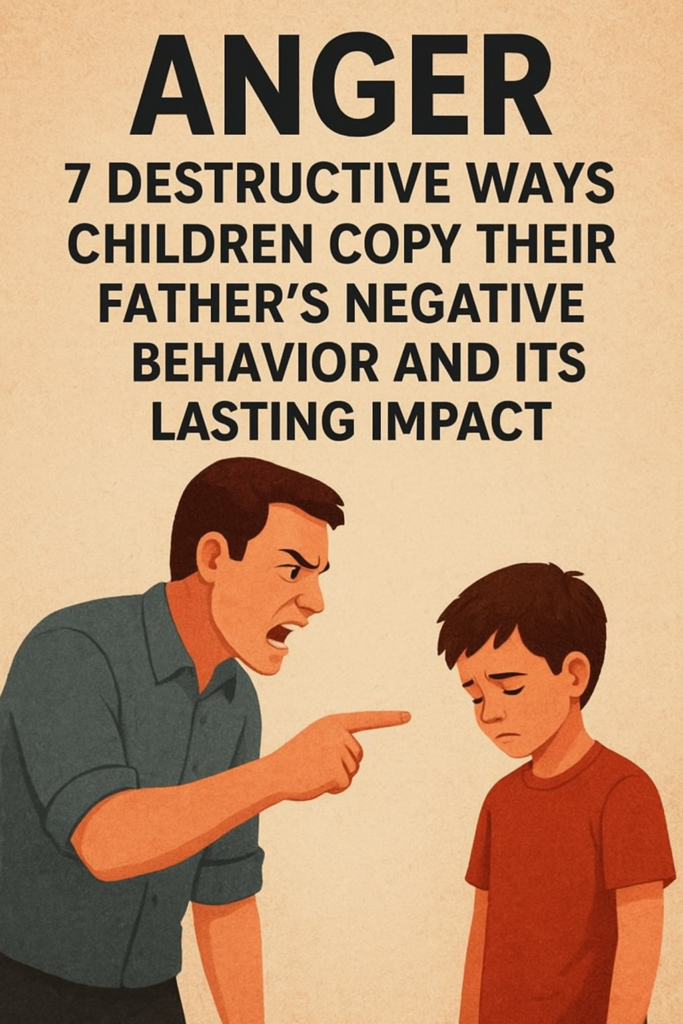
Anger: 7 Destructive Ways Children Copy Their Father’s Negative Behavior and Its Lasting Impact
Introduction
Children learn more from what they see than from what they are told. A father plays a powerful role in shaping a child’s emotional world, values, and behaviour. When a father handles life with patience, kindness, and balance, the child absorbs these qualities naturally. But when a father frequently expresses anger, frustration, or aggression, the child is likely to imitate the same behaviour—sometimes without even realizing it. Over time, this copied behaviour can lead to emotional struggles, relationship issues, and long-term difficulties in life.
This blog explores how children copy their father’s anger, the psychological problems they face because of it, and how parents can break this unhealthy cycle for the betterment of future generations.
The Power of Modeling Behaviour
Children are natural imitators. Psychologists often talk about “observational learning,” where kids copy what they see rather than what they are instructed. If a father shouts, slams doors, or reacts harshly in stressful situations, the child subconsciously registers this as an acceptable response.
A boy may grow up believing that showing anger is the only way to assert himself. A girl, on the other hand, may normalize receiving it from others and struggle to set healthy boundaries in relationships. In both cases, the modelling of negative behaviour becomes a cycle that is difficult to break.
How Anger Shapes a Child’s Emotional World
When a father repeatedly expresses it, it shapes the way a child feels about himself and the world.
- Fear and Anxiety – Children often live in constant worry, fearing the next outburst.
- Low Self-Esteem – Harsh words spoken in anger create deep scars that damage confidence.
- Suppressed Emotions – Some children become afraid to express themselves, bottling up feelings that later burst out in destructive ways.
- Overreaction to Stress – When facing challenges, they often resort to outbursts instead of problem-solving.
This emotional environment can set the tone for a lifetime of insecurity, mistrust, and conflict.
Anger and the Parent-Child Relationship
The bond between a father and child is deeply influential. But when anger dominates interactions, the relationship suffers. A child may feel distant, unloved, or misunderstood. Instead of turning to the father for guidance, the child might avoid him, leading to isolation.
Ironically, many fathers who show excessive anger are not intentionally trying to harm their children. Often, they are repeating patterns they themselves witnessed growing up. Unfortunately, the child receives the message that love and anger go hand in hand, which creates confusion and emotional turmoil.
The Problems a Child Faces Later in Life
Children who grow up in an environment where it is constantly present often struggle with multiple challenges as they become adults.
1. Relationship Issues
They may either become controlling and aggressive—mirroring their father’s behaviour—or overly submissive, tolerating unhealthy behaviour from partners.
2. Difficulty Handling Conflict
Instead of calmly resolving problems, they may escalate small disagreements into heated arguments, pushing others away.
3. Workplace Struggles
In professional settings, they may lash out at colleagues or fail to handle criticism constructively, harming their career growth.
4. Mental Health Challenges
Constant exposure to it in childhood increases the risk of depression, anxiety, and even post-traumatic stress symptoms in adulthood.
5. Parenting Repetition
Perhaps the most painful outcome is that these individuals often pass the same patterns of it onto their own children, continuing the cycle.
The Hidden Impact of Suppressed Anger
Not all children openly display the anger they learn. Some internalize it. They might appear calm on the outside but carry silent frustration and resentment inside. This suppressed anger often resurfaces later in harmful ways such as:
- Substance abuse
- Sudden emotional breakdowns
- Difficulty maintaining long-term commitments
- Physical health issues like high blood pressure or heart problems
This shows that whether anger is expressed or suppressed, the damage is real and long-lasting.
Breaking the Cycle of Anger
The good news is that this cycle does not have to continue forever. Awareness and conscious effort can bring positive change.
1. Self-Reflection by the Father
Acknowledging one’s tendency toward anger is the first step. Fathers must ask themselves: What am I teaching my child when I lose control?
2. Practicing Healthy Coping Strategies
Instead of yelling, fathers can model calm behaviour, problem-solving, and respectful communication. This gives the child new tools to handle stress.
3. Open Conversations
Talking to children about emotions—especially about why anger arises and how to manage it—helps them understand that feelings are normal, but aggressive reactions are not.
4. Professional Help
Therapy, anger management programs, or family counselling can be highly effective in breaking destructive patterns.
5. Positive Reinforcement
When children respond without anger, acknowledging their effort encourages them to repeat positive behaviour.
The Role of Mothers and Other Caregivers
While fathers hold a strong influence, mothers and caregivers also play a role in balancing the impact of anger. By showing consistent love, patience, and healthy communication, they can help children develop resilience. However, it is not about one parent “fixing” the other—it’s about creating a supportive environment where the child learns that kindness, not anger, builds stronger bonds.
Conclusion
When a child copies his father’s anger, he is not just imitating a momentary outburst; he is absorbing a life lesson that can define his emotional future. The problems he faces—fear, relationship struggles, poor conflict management, and mental health challenges—are heavy burdens to carry.
But cycles can be broken. With awareness, reflection, and conscious parenting, fathers can transform the legacy they pass on. Instead of anger, they can model patience, empathy, and resilience—values that will empower their children for life.
A father’s greatest gift is not material wealth or success—it is the emotional blueprint he leaves behind. Choosing love over anger can change generations to come.

